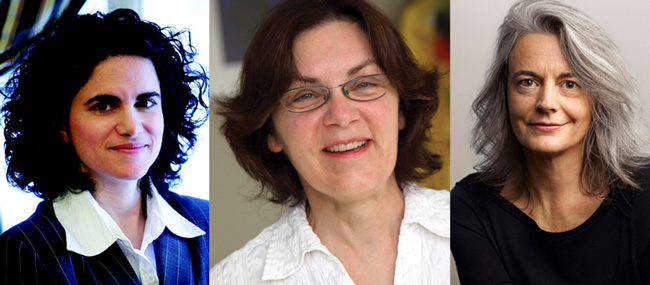
On May 4, from 5:30 to 7:30 p.m., Research and International Relations will host the fourth edition of In Her Own Words: Stories from Distinguished Research Careers, an event which features McGill’s most accomplished women researchers and academic administrators in conversation about careers in academia.
All researchers have a story to tell. This edition features Professor Antonia Maioni, Department of Political Science and incoming Dean of the Faculty of Arts; Professor Brigitte Kieffer, Professor of Psychiatry and Scientific Director of the Douglas Research Centre; and Professor Ghyslaine McClure, Department of Civil Engineering and Applied Mechanics, and Assistant Provost (Budget and Resources). Victoria Leenders-Cheng, the Communications Officer for the Faculty of Law, will moderate an hour-long discussion focused on the diverse experiences of these researchers in navigating the academic environment, including their advice on overcoming the professional challenges of being a woman in academia. McGill’s Principal and Vice-Chancellor Suzanne Fortier will deliver opening remarks at the event. A networking cocktail will follow the formal portion of the event. Register for the event online.
The Reporter spoke with each of the panelists in advance Wednesday’s conversation.
The In Her Own Words event is founded on the idea that everyone has a story about becoming a researcher and a story about how research has made a difference. Why do you think it’s important for women in particular to share their stories about making a career in academia?
Antonia Maioni: It’s important because change has happened so rapidly and deeply in the academy. Let me highlight two ways. First, gender balance: in my discipline, for example, there were very few women as role models and mentors when I was a student and junior scholar, even fewer in administration or leadership. Second: the power of example. Women in the academy were few and far between, but they were exceptional not only in their research, which was not limited to gender but ran the gamut of the disciplines, and also in their commitment to leadership and mentoring as part of the academic mission.
Ghyslaine McClure: It is important to share so that we all understand that there is no secret or nothing spectacular about these stories. There is hard work and persistence. Life in academia is tough.
Brigitte Kieffer: I found nature fascinating, and liked to play. I wanted to be free (hence doing research in academia), and was always pushed by curiosity. I did not think in terms of career, and went where my curiosity took me. That I was a woman in science never occurred to me, only until recently!
What do you wish you’d known about pursuing a career in academia that you didn’t learn while studying?
Antonia Maioni: That networks are so important – crucial, really, to success in academia today. And women, who over the course of human history have understood that it takes a village, have changed the academy because of that. The lone scholar or big thinker is no longer a prevalent model in the social sciences and humanities. Women have not only helped change that model, they are also well-equipped to navigate the new emphasis on partnership, outreach and communication.
Ghyslaine McClure: I did not anticipate a career in academia when I was studying. I was aiming at a research career, but not necessarily in academia. I had no academic career plan, it happened, one thing leading to another.
At the upcoming In Her Own Words panel, what other issues do you hope to discuss?
Ghyslaine McClure: The importance of having realistic expectations about career and life in general. And the importance of communicating these expectations to others – who reads minds?
Brigitte Kieffer: Women are strong but lack confidence. I’d also like to discuss the glass ceiling, and the passion for science.
